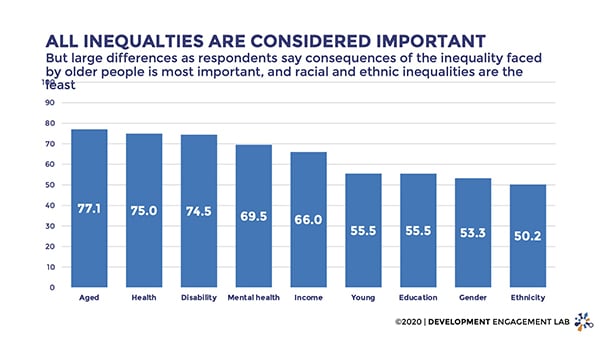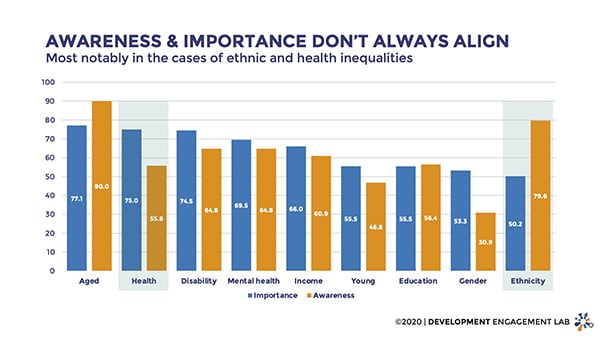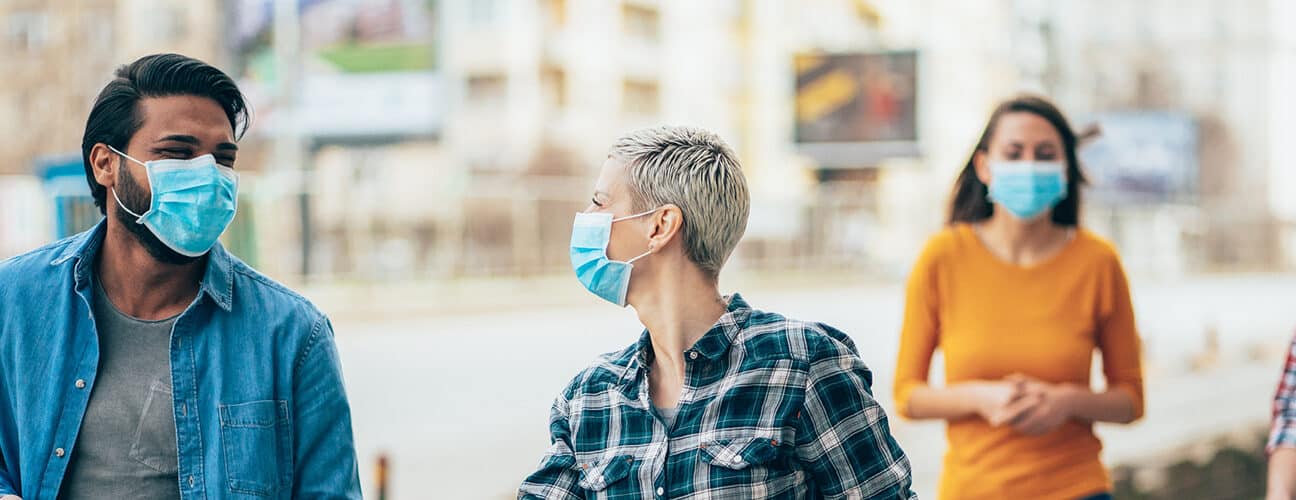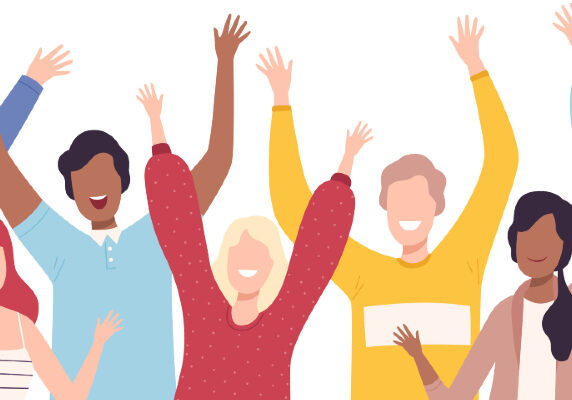Has Covid-19 made the public more aware of inequality?
Covid-19 has laid bare many of society’s most pernicious inequalities, but is the general public aware of the inequalities exacerbated by the pandemic?
Which types of inequality receive the most attention and support? And does increased awareness around inequalities mean anything for how the public engage with these issues?
In an October 2020 Development Engagement Lab survey of the British public, 41% of respondents reported believing that the impact of Covid-19 is highly unequal. 61% said they would tolerate a delay in the economic recovery from the pandemic if it meant that economic inequality could be reduced. Finally, a whopping 33% said that inequality between the rich and the poor is an issue of top concern in Great Britain.
Concerns about the economy and jobs were high before Covid-19, but has the pandemic’s uneven impacts on women, the elderly and people of colour influenced the public’s view of other forms of inequality?
We asked a representative sample of the British public to rate their awareness of nine forms of inequality, then rate the same inequalities based on how important they are. Respondents were randomly assigned statements about one form of inequality, only. Statements included: “Covid-19 has exposed and worsened inequality. For example, Covid-19 will increase the number of people living with chronic illness – such as cardiovascular disease, respiratory conditions, and diabetes – creating new health inequalities that require additional care from the NHS.”
We then asked respondents, “Thinking about the following statement, is this something that you have heard, seen or read about before today?”
Figure 1 shows how aware respondents were of the various forms of inequality.

As you can see, awareness varied a lot. 90% of respondents reported awareness of Covid-19’s unequal impact on the aged, while only 31% reported hearing statements about its unequal effects on women. This is despite strong evidence in Great Britain earlier in the year that British respondents were aware of gender inequality in the pandemic: the contrasting results suggest publics are simply more aware of forms of inequality other than gender.
Subscribe to our newsletter
Our weekly email newsletter, Network News, is an indispensable weekly digest of the latest updates on funding, jobs, resources, news and learning opportunities in the international development sector.
Get Network NewsNext, we asked our respondents to assess the importance of the type of inequality they had been prompted with, ranking its importance on a scale of 1-4 (1 being least important).

As you can see, the disparity between types of inequality is much smaller than the scale for awareness – none scored less than 50%. Why? Possibly respondents agreed that despite their personal awareness, all nine forms of inequality are pretty important.
Still, it’s impossible to ignore the stark difference between age inequality, at 77%, and ethnicity, at 50% (even though half of our respondents said it was important). Likewise, that gender falls so low on both lists is discouraging.
What’s perhaps most striking is the extreme shift of certain types of inequalities when moving from an assessment of awareness to one of importance. Figure 3 offers a comparison.

Health inequality moves from seventh in awareness, to the second most important. Did the public hope that prioritising health during a pandemic might cast the widest net, reaching other neglected groups? Or is it possible there is a fundamental misunderstanding of the nature of health inequality? Health’s low ranking on the awareness scale (7th) possibly backs this assumption up. The meaning of health inequality might, even in a pandemic, be lost on the public.
Even more startling is the shift of racial/ethnic inequality when comparing awareness and importance. People seem to think they are very aware of racial/ethnic inequality (it ranked second after age!) but when asked if it was important, ranked it dead last.
Even in the shadow of a pandemic, 2020 has been a landmark year for racial justice activism and organising, particularly the Black Lives Matter movement and the grassroots campaigning to take down colonialist statues. These initiatives have clearly paid off in terms of raising awareness, but what about importance?
What does this mean for campaigning?
For organisations, the message is clear: The public are aware of inequality, but that awareness varies. It’s true that certain types – health and racial ethnic inequality – are firmly on the public’s radar, and this suggests there may be a case for drawing a more interconnected, inclusive picture of inequality.
How, for example, does gender inequality impact fair labour practices and income distribution? How are young people – beginning their careers in a pandemic – likely to fare in a downturned economy? The sector is growing more adept at connecting these dots, and Covid-19 presents a difficult but essential case for tackling all forms of inequality.
The public’s assessment of the importance of inequality is encouraging. Not a single form of inequality fell below 50% when ranked by the public, and all fell within a narrow – but high – range. Fortunately for those working in the sector, tackling inequality is not a zero-sum game: ending gender inequality can’t be done without ending education inequality. Disability inclusion can’t be accomplished without improving access to healthcare. The public are clearly on board with a more encompassing definition of inequality.
Still, we can’t ignore the strange and perverse effect observed around racial/ethnic inequality: The public are very aware of disparity, and yet view it as among the least important.
Clearly it’s time for a conversation that moves beyond the challenges faced by people of colour, and confronts directly the grinding urgency of racial/ethnic inequality. Clearly we live in a society that has shielded itself from these impacts: the sector must work harder to shine a light on systemic and institutional racism and the way in which it not only degrades the lives of people of colour, but weighs down society as a whole.
Category
News & ViewsThemes
Public Support



